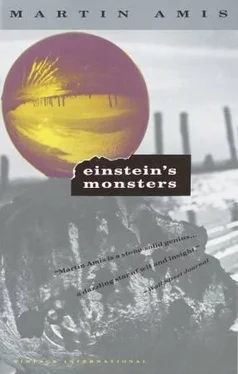Martin Amis - Einstein's Monsters
Здесь есть возможность читать онлайн «Martin Amis - Einstein's Monsters» весь текст электронной книги совершенно бесплатно (целиком полную версию без сокращений). В некоторых случаях можно слушать аудио, скачать через торрент в формате fb2 и присутствует краткое содержание. Жанр: Современная проза, на английском языке. Описание произведения, (предисловие) а так же отзывы посетителей доступны на портале библиотеки ЛибКат.
- Название:Einstein's Monsters
- Автор:
- Жанр:
- Год:неизвестен
- ISBN:нет данных
- Рейтинг книги:5 / 5. Голосов: 1
-
Избранное:Добавить в избранное
- Отзывы:
-
Ваша оценка:
Einstein's Monsters: краткое содержание, описание и аннотация
Предлагаем к чтению аннотацию, описание, краткое содержание или предисловие (зависит от того, что написал сам автор книги «Einstein's Monsters»). Если вы не нашли необходимую информацию о книге — напишите в комментариях, мы постараемся отыскать её.
In his new role, Amis runs around like the sheriff in Jaws, as if he's the only person who knows there's a shark in town and everyone else is trying to keep the beaches open. The Esquire article gives a good sense of the fundamental cheesiness of his political thinking. The members of the Washington nuclear establishment, he says, don't mind talking about "X-ray lasers and hard-kill capabilities,' but they "go green' when the author tries to light up a cigarette. When the author interviews an attache from the Soviet embassy, on the other hand, things go differently; the two "drink a lot of coffee and smoke up a storm.' "Sergi and I got along fine,' Amis tells us. "He didn't want to kill me. I didn't want to kill him.' Amis has invented the Marlboro Peace Plan.
Einstein's Monsters is only a touch more subtle. It consists of five stories, along with both an "Author's Note' and an Introduction. In his Note, Amis vacillates upon the question of whether the stories are polemical. "If they arouse political feelings,' he tells us, "that is all to to the good,' but really, they "were written with the usual purpose in mind: that is to say, with no purpose at all-except, I suppose, to give pleasure, various kinds of complicated pleasure.'
If there is any confusion in the reader's mind, however, it is cleared up by the first story, "Bujak and the Strong Force.' Reading it, one is reminded of the experience of sitting in a college fiction workshop, the excited author right there next to you, enthusiastically explaining the intricacies of his story's symbolic order.
Bujak, the title character, is a hugely powerful Eastern European living in a bad neighborhood in London. A survivor of the Nazi occupation of Poland, he spends a great deal of time arguing with the (American) narrator over the value of revenge. The narrator is anti, Bujak is pro. Bujak polices his block, rounds up petty criminals, makes the streets safe for young ladies at night. "He was our deterrent,' the narrator says. At the end of the story, when Bujak returns to his home to find his mother, daughter, and granddaughter brutally rape-murdered, the drunken perpetrators lying asleep on the floor, we expect him to exact some terrible revenge. But he doesn't. "Why?' the narrator asks. "No court on earth would have sent you down.' (Is this how Americans speak, by the way?) "When I had their heads in my hands,' Bujak replies, "I thought how incredibly easy to grind their faces together. But no… I had no wish to add to what I found.' It's… unilateral disarmament!
Throughout Einstein's Monsters Amis the author is at war with Amis the nuclear theoretician. "Insight at Flame Lake,' for example, would have been a fine schizophrenic-breakdown story, except that Amis the theoretician felt compelled to tack on an anti-nuclear subtext. "Thinkability,' the long introduction to Einstein's Monsters, has its flashes of brilliant writing (the generations of unborn babies who would be aborted by a nuclear war are described as "queueing up in spectral relays until the end of time'), but it is marred by the same sort of simplistic reasoning that plagues the Esquire piece. Amis wants to pin all our problems on the existence of nuclear weapons. In the face of these missiles, no merely personal atrocity matters: "What vulgar outrage or moronic barbarity can compare with the black dream of nuclear exchange?' It's like asking a meter maid, "How dare you give me a ticket when there are Russian tanks illegally parked on the streets of Kabul?' But Amis the satirist knows that it takes a lot more than nuclear weaponry to explain the spiritual malaise of our century, just as Amis the writer knows (or ought to know) that there is always more than one explanation for any human phenomenon. One suspects, in fact, that Amis's opposition to the Strategic Defense Initiative is derived not from the fear of a perilous escalation in the arms race, but from a (perhaps unconscious) perception that, with nuclear weapons gone, the novelist would have to face the fact of unexcused human weakness again.












